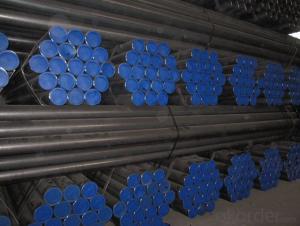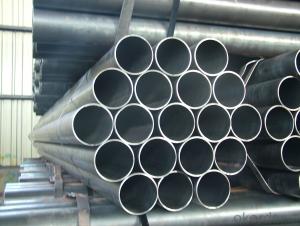Best roller pipe for mining industry
- Loading Port:
- China Main Port
- Payment Terms:
- TT OR LC
- Min Order Qty:
- -
- Supply Capability:
- -
OKorder Service Pledge
OKorder Financial Service
You Might Also Like
Outside diameter | 1/2”-12” |
Wall Thickness | 1.0 -12mm SCH40,60,80, etc. |
Tolerance | ±5% |
Material | Q195,Q215,Q235,Q345 |
Quality grade | First grade |
Section Shape | Round |
Surface Treatment | Hot rolled and ERW |
Technique | Hot rolled |
Ends | Threaded Ends, Grooved Ends |
Length | Less than 12m |
MOQ | 10 Metric Ton or as your request if normal size |
Deliver Time | Stock |
Package | Nude pipe in bundle or as your request |
Payment terms | T/T,L/C |
Standard | GB/T3091-2008; BS1837-1985; ASTM A53/A53M-07; ASTM A513-07; ASTM A252; JIS G3444-06; JIS G3452-2010; EN10255; DIN2440 |
Main Usage Relevant Size | 1. Water Pipe Material: Q195/Q215/Q235/Q345B Outside Diameter: 60-273mm 2. Threaded/Screwed Pipe Material: Q195/Q215/Q235/Q345B Outside Diameter: 21.3-165.1mm 3. Structural Steel Pipe Material: Q195/Q215/Q235/Q345B Outside Diameter: 21.7-190.7mm 4. Scaffolding Pipe Material: Q195/Q215/Q235/Q345B Outside Diameter: 48mm 5. Straight Seam Welded Pipe Material: Q195/Q215/Q235/Q345B Outside Diameter: 48-273mm 6. Steel pipes with a longitudinal ERW Material: Q195/Q215/Q235/Q345B Outside Diameter: 21.3-273.1mm Standard: GB/T 3091-2008 |
- Q:What are the different types of steel coatings used for pipes?
- There are several types of steel coatings used for pipes, including epoxy, polyethylene, polypropylene, and fusion bonded epoxy (FBE) coatings. Each of these coatings provides different levels of corrosion resistance and protection, making them suitable for various applications and environmental conditions.
- Q:How are steel pipes used in the construction of buildings?
- Steel pipes are commonly used in the construction of buildings for various purposes. They are primarily used for structural support, providing stability and strength to the overall framework. Steel pipes are also used for plumbing systems, carrying water and other fluids throughout the building. Additionally, they are used for HVAC (heating, ventilation, and air conditioning) systems, allowing for efficient distribution of air. Overall, steel pipes play a crucial role in ensuring the durability, functionality, and safety of buildings.
- Q:How are steel pipes made?
- Steel pipes are made through a process called seamless or welded pipe manufacturing. In seamless manufacturing, a solid steel billet is heated and pierced to form a hollow tube. It is then stretched and rolled to the desired diameter and wall thickness. Welded pipes are made by bending and welding a steel plate or strip to form a cylindrical shape. The welded seam is then heat-treated to ensure its strength and durability. Both processes involve subsequent finishing and inspection to meet the required specifications and quality standards.
- Q:How are steel pipes used in the construction of natural gas power plants?
- Steel pipes are used in the construction of natural gas power plants for various purposes, including transporting and distributing the natural gas. These pipes are used to connect the gas supply to different components of the power plant, such as turbines, boilers, and generators, ensuring a reliable and efficient flow of gas throughout the facility. Additionally, steel pipes are also used in the construction of the power plant's infrastructure, such as the cooling systems, exhaust systems, and other equipment that require durable and corrosion-resistant materials.
- Q:Are steel pipes resistant to ultraviolet (UV) radiation?
- Ultraviolet (UV) radiation poses a threat to steel pipes as they do not possess inherent resistance. This type of radiation has the potential to induce degradation and discoloration in various materials, including steel. However, the extent of harm inflicted depends on several factors, including steel type, duration and intensity of UV exposure, and the presence of protective coatings or finishes on the pipes. Generally, uncoated steel pipes are more vulnerable to UV damage compared to those treated with protective coatings or finishes. Coatings such as epoxy or polyethylene act as a shield against UV radiation, effectively preventing steel degradation and discoloration. Hence, it becomes crucial to consider the specific application and environment when selecting steel pipes and implementing suitable protective measures to ensure their durability and performance.
- Q:What are the advantages of using steel pipes over other materials?
- Using steel pipes instead of other materials has several advantages: 1. Exceptional strength and durability: Steel pipes have the ability to withstand high pressure, heavy loads, and extreme weather conditions. This makes them suitable for various uses, such as transporting fluids and gases, providing structural support, and laying underground pipelines. 2. Enhanced resistance to corrosion: Steel pipes can be coated with different materials to increase their resistance to corrosion. This makes them ideal for transporting corrosive substances like water and chemicals without the risk of pipe degradation. Additionally, steel pipes are less prone to rust, which prolongs their lifespan. 3. Long-term cost-effectiveness: Although the initial cost of steel pipes may be higher than other materials, they offer long-term cost-effectiveness. Due to their durability and resistance to corrosion, steel pipes require less maintenance and replacement, resulting in reduced operational costs over time. 4. Versatility: Steel pipes come in various sizes, shapes, and thicknesses, making them versatile for different applications. They can be easily customized and fabricated to meet specific requirements, such as bending, welding, and threading. 5. Fire resistance: Steel pipes have a high melting point, making them resistant to fire and reducing the risk of structural damage in case of a fire incident. This characteristic is particularly important in industries where fire safety is crucial, such as oil and gas, chemical, and construction. 6. Environmentally friendly: Steel is a recyclable material, and steel pipes can be recycled and reused multiple times without compromising their quality. This not only reduces the demand for new materials but also contributes to environmental sustainability. 7. Excellent flow characteristics: Steel pipes have smooth internal surfaces, minimizing friction and allowing for efficient flow of fluids and gases. This advantage is particularly significant in industries where fluid dynamics and energy efficiency are essential, such as oil and gas, water supply, and HVAC systems. In conclusion, steel pipes offer numerous advantages over other materials, including strength, durability, corrosion resistance, cost-effectiveness, versatility, fire resistance, eco-friendliness, and excellent flow characteristics. These advantages make steel pipes the preferred choice for a wide range of applications in various industries.
- Q:How are steel pipes used in heating systems?
- Steel pipes are commonly used in heating systems to transport hot water or steam from the boiler to various heating devices, such as radiators or baseboard heaters. The steel pipes are durable and can withstand high temperatures and pressure, ensuring efficient and safe distribution of heat throughout the building.
- Q:How are steel pipes used in firefighting systems?
- Steel pipes are commonly used in firefighting systems as they provide durability and resistance to heat, making them ideal for transporting water or fire extinguishing agents. These pipes are used to create a network of water supply lines, sprinkler systems, and hydrants that are crucial for effectively extinguishing fires and controlling their spread.
- Q:Can steel pipes be used for geothermal heating systems?
- Yes, steel pipes can be used for geothermal heating systems. Steel pipes are commonly used for their durability and ability to withstand high temperatures and pressures. They are suitable for transferring geothermal heat from the ground to the heating system within a building. However, it is important to consider the specific requirements of the geothermal system and consult with professionals to ensure proper installation and compatibility with the system components.
- Q:How are steel pipes protected against ultraviolet (UV) radiation?
- Steel pipes can be protected against ultraviolet (UV) radiation through the application of coatings or paints that act as a barrier between the pipe surface and the UV rays. These coatings are specifically designed to resist the damaging effects of UV radiation, such as fading, chalking, or degradation of the steel material. One common method of protection is the use of UV-resistant paints or polymeric coatings that contain special additives or pigments that reflect or absorb UV rays. These coatings not only shield the steel from UV radiation but also provide an additional layer of corrosion protection, extending the lifespan of the pipes. Another method used for UV protection is the application of thermal insulation materials. These insulating materials, such as foam or coatings with reflective properties, are capable of reducing the impact of UV radiation on the steel pipes. They act as a shield, preventing direct exposure to the UV rays and minimizing the potential damage caused by prolonged exposure. It is important to note that the choice of UV protection method depends on various factors, including the specific application, environmental conditions, and the required durability of the steel pipes. Consulting with experts in the field can help determine the most suitable UV protection solution for a particular project or application.
1. Manufacturer Overview |
|
|---|---|
| Location | |
| Year Established | |
| Annual Output Value | |
| Main Markets | |
| Company Certifications | |
2. Manufacturer Certificates |
|
|---|---|
| a) Certification Name | |
| Range | |
| Reference | |
| Validity Period | |
3. Manufacturer Capability |
|
|---|---|
| a)Trade Capacity | |
| Nearest Port | |
| Export Percentage | |
| No.of Employees in Trade Department | |
| Language Spoken: | |
| b)Factory Information | |
| Factory Size: | |
| No. of Production Lines | |
| Contract Manufacturing | |
| Product Price Range | |
Send your message to us
Best roller pipe for mining industry
- Loading Port:
- China Main Port
- Payment Terms:
- TT OR LC
- Min Order Qty:
- -
- Supply Capability:
- -
OKorder Service Pledge
OKorder Financial Service
Similar products
New products
Hot products
Related keywords






























